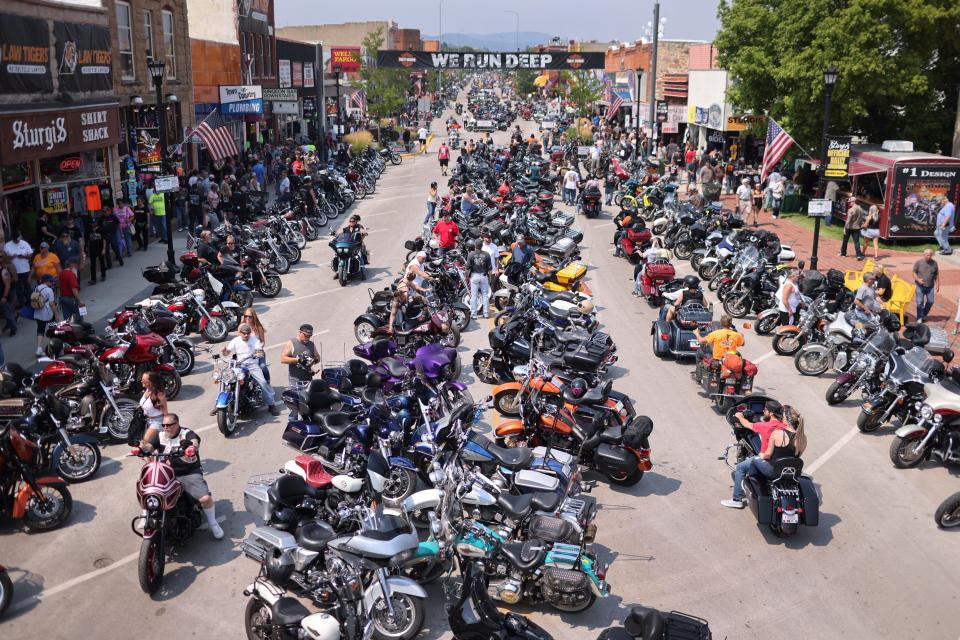Organ transplants spike during motorcycle rallies, study finds. Here's what that means.

As hundreds of thousands of bike enthusiasts flock to motorcycle rallies each year, a new study found organ transplants tend to spike during these large events.
The report, published Monday in JAMA Internal Medicine, analyzed organ donor and transplant recipient data from 2005 to 2021 during seven of the largest motorcycle rallies in the U.S. Researchers from Harvard Medical School examined organ donors 16 and older who were involved in a motor vehicle crash and found organ donors increased by 21% and transplant recipients by 26% during rally dates.
The data also suggests not all donors during the events were rally attendees, as study authors found no difference when comparing demographic and clinical characteristics of donors during the rally and non-rally times.
Experts say the study’s findings highlight the need for city officials and event organizers to increase traffic safety measures during events, as well as for health care providers to prepare for trauma care and organ transplantation.
“It’s clear that there’s an underlying excess mortality that we should work to prevent,” said lead author Dr. David Cron, a Harvard Medical School clinical fellow at Massachusetts General Hospital. “But as long as there is an unfortunate increase in traffic fatalities, we should do everything we can to translate these tragic, preventable deaths into a gift of life."
MORE ON ORGAN TRANSPLANTS: Advances offer hope for millions more
GOOD NEWS:Families share a happy holiday after a kind cop's kidney donation
Massive Sturgis Motorcycle Rally included in study
The Sturgis Motorcycle Rally in South Dakota, which was included in the study's analysis, draws about 500,000 visitors to its 10-day event in August.
This year’s rally resulted in three deaths, 50 injury crashes, and 148 DUI arrests, according to the South Dakota Department of Public Safety.
Sturgis City Manager Daniel Ainslie told USA TODAY the city of about 7,000 people offers an hourly bus service during the event to reduce the risk of motor vehicle accidents.
“Having the buses gives rally attendees the option to spend time in downtown Sturgis without worrying about putting themselves or their passengers in danger when returning to where they are staying,” he said.

The city also created a color-coded map highlighting the easiest and most difficult roads for riding a motorcycle. Ainslie recommends motorists take extra precaution when riding or driving during rallies, including:
Give yourself extra distance and time to react.
Signal in advance, and incorporate arm turn signals.
Avoid speeding, weaving between lanes or making sudden maneuvers.
Don’t pass on blind corners or where visibility is limited.
If you’re new to the area, review riding maps before you go.
Constantly scan the road for wildlife and other hazards.
Know how to handle your bike in varying conditions including wind, rain, fog, gravel, sand, work zones, or other uneven surfaces.
Other rallies studied included Daytona Bike Week, Laconia Motorcycle Week, and Republic of Texas Biker Rally. Organizers did not respond to USA TODAY's request for comment.
STURGIS RALLY: 2020 event tied to more than 400 COVID cases across 30 states
Other lessons from the study
The study emphasizes the importance of preparing health care systems for an uptick in organ donations during rallies, said Dr. Dorry Segev, professor of surgery and population health and direction of the Center for Surgical and Transplant Applied Research at NYU Langone Health, who is unaffiliated with the study.
“You need to increase staffing in the emergency room and increase staffing in organ procurement organizations and have transplant centers on alert,” he said. “It’s important to understand these things in the context of strategizing the health care system and health care resources.”
The National Highway Traffic Safety Administration says bikers are about 28 times more likely to die in a motor vehicle crash than a person in a car. But Segev hopes future studies can look at other large-scale events to see if motorcycles alone increase that risk at these rallies or if crashes happen because of more traffic.
Segev said he was “quite moved” by how the community appears motivated to help others during untimely tragedy.
“There are plenty of instances in this country where more people die but we don’t have more donors,” he said. “If you’re going to be a part of a community that is celebrating the freedom of being on a motorcycle with its inherent risks, it’s great to be aware of also celebrating the gift of life and organ donation.”
Follow Adrianna Rodriguez on Twitter: @AdriannaUSAT.
Health and patient safety coverage at USA TODAY is made possible in part by a grant from the Masimo Foundation for Ethics, Innovation and Competition in Healthcare. The Masimo Foundation does not provide editorial input.
'LIVESAVING GIFT': Baby with rare disease receives new heart after waiting 218 days
MORE: Organ transplants were slashed at the start of the pandemic. But 2021 saw the most ever.
This article originally appeared on USA TODAY: Motorcycle rallies like Sturgis may increase organ transplants: Study

 Yahoo Movies
Yahoo Movies 
